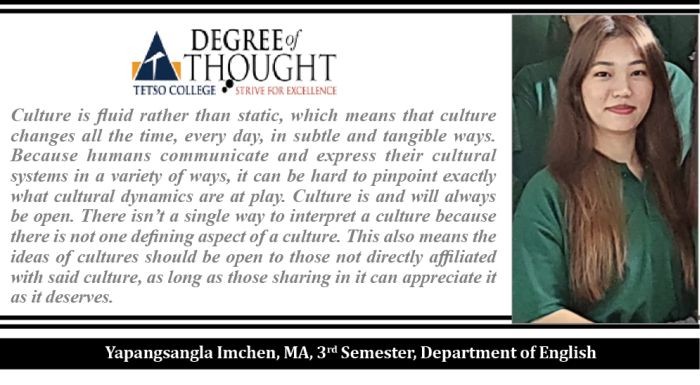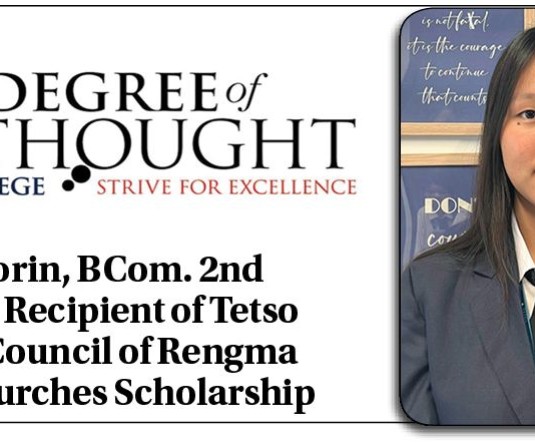
What is culture? What is tradition? And what is cultural loss? These are the three cardinal questions that needed to be addressed in this 21st century. At any rate, loss of indigenous culture and its repercussions is a grim topic of the day. Oftentimes this issue is talked about in the school, social gatherings and other occasions. However, the debates held during such gatherings end up dealing with the surface meanings. Therefore, it still deserves a critical insight from the creative facilities-man of wisdom, author, historians and antiquarians, to bring to light the repercussions caused by a gap in our civilization and the gradual decline of the indigenous culture. Here, I am dealing in the context of Northeast Indian indigenous culture and tradition.
The term “western” cannot be thought of without the word “Modernization” and “Westernization”. For example, today, the young Nagas are so much into the western ways of life-living style, dresscode, habits and the like. Humorous, perhaps, the Nagas are fond of imbibing alien culture! Look around, every keen eye will witness how Korean culture has a sweeping effect on the younger generations. The saying, “Nagaland is a land of festivals” exists only in theory. Of course, the pomp and show during festivals and Hornbill festival are to be expected to attract tourism. Today, with the multi-cultural influences, we are rendered almost as the confused Nagas. This arises due to a gap in our civilization.
But, how and when did we start embracing alien culture at the cost of ours? This question will take us back to history and it starts somewhere in the dim past. Before Indian independence, the regions (Northeast Indian as a whole) were in the primitive age-the “Perfect Culture”. They were one in harmony with nature and surroundings. The minds of the people are unpolluted. However, the dawn of 1947 sowed a seed of cultural revolution and was marked by the permanent impact of the Western civilization. Thus, all of a sudden, there is a change in culture in the region- from primitive to a civilized culture within a short span of time. This leads to a gap in our civilization and marks a major impact in the growth of Native culture. It is not without its repercussions.
Today, we see many repulsive elements like dishonesty and corruption in our daily walks of life. These elements are mostly prominent in the political arena. Likewise, Religion is another. Conflicting elements in the region. Prom time below, people see God in Nature. But today this religion no longer exists in the region, yet we still believe in supernatural elements and spirits. To give testament to these arguments we can bring references from the North Eastern Indian writers - Temsula Ao, Easterine Kire, Dhruba Hazarika, Mamang Dai, Mitra Phukan, Aruni Kashyap and the like. These writers in almost all of their works echo the same subject-a gap in our civilization and the gradual decline in the indigenous culture. Also, they sense a conflict when we bring home alone culture.
Similarly, “Feminism” is another topic alien to our primitive culture. Today, with the influence of alien culture, feminist movement is on rise in the region. However, for example, when we look into Naga culture, we can see that such movements were alien back then. It is because girls and women were given equal respect from time below. Fathers and brothers were always ready to protect them. Women were generally considered as the most important structure of society and given due respects. The privileges of women in Naga society during primitive age or I call it perfect culture, are discussed mostly by the prominent Naga writer, Easterine Kire in her works. Also, there are lots of folktales and folklore about how fathers and brothers protected women in a family from the enemy. However, today, cultural influences have given way to feminist movement in Nagaland regardless of their position from time below. I am not against it totally. However, the idea here is to think upon such a movement as to whether it is deemed good for our society and to reconsider it before taking things as perfectly correct.
Yet, imbibing the brighter side of other cultures doesn’t amount to any havoc. Nor am I totally against “Modernization”. However, it cannot be completely ignored that a gap in our civilization has caused a major impact in the growth of our native culture. Had it been our primitive culture undergone its full development (like the western civilization), today, our culture would have reached its highest perfection, and the society would be free from the conflicting ideas. Truth be told, bringing home alien culture is always conflicting. Therefore, there is a need to think upon and reconsider it. To encapsulate, whatever it be, to preserve culture and heritage, is the need of the hour.
Degree of Thought is a weekly community column initiated by Tetso College in partnership with The Morung Express. Degree of Thought will delve into the social, cultural, political and educational issues around us. The views expressed here do not reflect the opinion of the institution. Tetso College is a NAAC Accredited UGC recognised Commerce and Arts College. The editors are Dr Hewasa Lorin, Dr Aniruddha Babar, Khangpuiliu Pamei, Rinsit Sareo, Meren and Kvulo Lorin. For feedback or comments please email: dot@tetsocollege.org.






